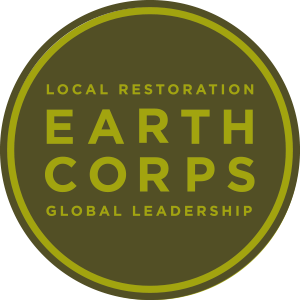Prioritizing People and the Planet
An Inspirational Letter from EarthCorps Board Vice President, Shanon Tyland

Hello, my name is Shanon Tysland and I have had the honor to serve on the board of directors of EarthCorps for the past year. I love the work EarthCorps is doing to restore habitats and build environmental leaders for the world we are all living in. Through the past year, I have witnessed a shift in prioritizing both people and the planet in this organization and it is both inspiring and uncomfortable as I learn and unlearn the connection between harm done to the environment and people of color.
Last month I had the privilege of attending the 1% For the Planet Global Summit in Los Angeles. This has been an annual summit composed of businesses and individuals who donate 1% of their revenue to environmental nonprofits working to improve the health of our planet. It has been canceled the previous two years for covid, and I have sorely missed connecting and learning from organizations on what they are doing to use business for good. Personally, I love our beautiful planet and it pains me to see the devastation it is going through on a continual basis, much of which I have contributed to just by existing in the consuming system we all live in. Whether it is from the single-use plastics that my groceries are packaged in and will end up in a landfill or the electronics I use that are ‘recycled’ and then shipped across the world when I have ‘recycled it’ to sit in someone else’s community.
The founders of 1% for the Planet are Craig Matthews and Yvon Chouinard, both successful entrepreneurs, who happen to be white, male, cisgender, and able-bodied. These are identities that I have not really taken into account in years past as I too am a white, male, cisgender, able-bodied, entrepreneur. However, the social justice issues that are shedding light on institutional racism that have been front and center for all of us to see have challenged my way of thinking and being. I am coming to understand the privilege I have from my identities in this system and am working on how I can use that privilege to be better.
For the first time in four of the four global summits I have attended I heard the voices of marginalized voices amplified. I heard Leah Thomas, a young black woman, author of the book ‘The Intersectional Environmentalist’ share why we need to prioritize social justice and environmental work together. This gal just hit it out of the park, she defines intersectional environmentalism (IE) as “an inclusive approach to environmentalism that advocates for the protection of both people and the planet. IE argues that social and environmental justice are intertwined and that environmental advocacy that disregards this connection is harmful and incomplete. IE focuses on achieving climate justice, amplifying historically exclude voices, and approaching environmental education, policy, and activism with equity, inclusion, and restorative justice in mind.”
As a world, we have to be better at prioritizing people and the planet. Our planet doesn’t have a voice, and yet it provides everything we need to live life. We consume goods and products at an unsustainable pace. Marginalized communities have to fight for their voices to be heard and they are statistically the most impacted by environmental degradation. Leah speaks in detail about both the impact on people and the planet and the connections between the two. Gandhi has a famous quote saying ‘we must be the change we wish to see in the world.’ Until we fully know and understand the truth of the impacts of our choices and actions along with the system we are living in it is difficult to make the change we need.
My first call to action is to read the book “The Intersectional Environmentalist” by Leah Thomas. She provides research, science, and lived perspectives on the degrading impact on people and the planet. We need to understand the impact that our daily actions are having on those around us. For example, I have an electric car, which I think is a great idea, however, as I look into the practices of lithium extraction and who is impacted, it makes me cringe. About 70% of lithium is mined in South America on Indigenous lands. The practices of extraction are not taking into account how to create a sustainable practice that supports all people and the planet. We must be better.
We can make better choices. Earth Day is today, but let’s be real, every day should be Earth Day, none of us exist without a healthy planet, at least not for long. We can all support policy and leaders that prioritize people and the planet over the bottom line. Do your research on where you are spending and donating your dollars.
I am so proud to serve on the board of EarthCorps as this organization is putting significant intention into prioritizing both people and the planet as it looks to the future and how we can be better. My question to you and myself is how can we be 1% better each day? Support organizations like EarthCorps whose bottom line is people and the planet. Support people like Leah Thomas who are making a stand for all voices, especially those who are marginalized. We are all in this together, let’s get busy making changes we will all benefit from!
Shanon Tysland

